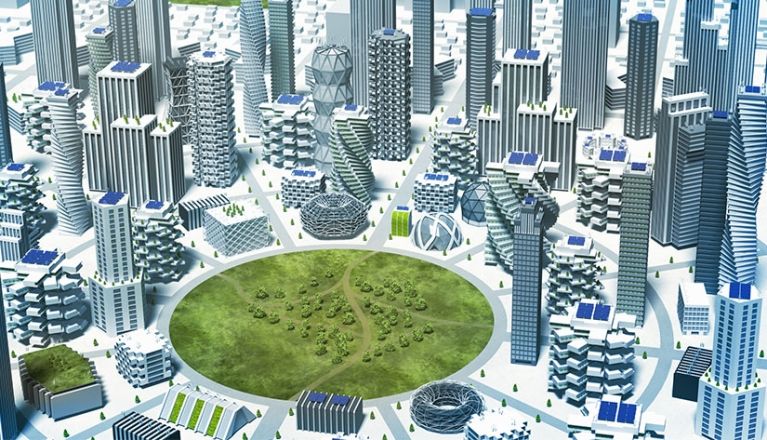- #Environment
- 2021/04/07
- 0
-
5
Smart cities, where innovation serves the cities of the future
To address climate change and optimise the use of resources, some sustainable cities are using new technologies to gather data on transport choices, pollution levels, consumption habits, etc. What makes a city "smart"? What initiatives are already under way in France? Why do smart cities sometimes attract criticism?

What is a smart city?
A smart city is an urban area that gathers data on the behaviour of its users and its infrastructure via meters, sensors and cameras fitted on street furniture (streetlights, bus shelters, rubbish bins, water and electricity distribution networks, etc.). These data on transport, pollution, consumption habits, etc. are then analysed using digital tools. Once the data are processed, they allow decision makers to adopt policies to optimise the city's resources and habits.
In practical terms, a smart city can adjust the lighting in public buildings according to the level of sunlight, inform people about the most polluted parts of the city, or quickly detect a leaking water main, for example.
For housing, smart city homes can be fitted with sensors that align the family's real time consumption with weather conditions (temperature, sunlight conditions) and automatically adjust the supply of energy.
For transport, sensors can transmit real time information about traffic conditions and identify congested roads or accidents. The information is managed by the city authorities but is made available to users via mobile apps.
By design, smart cities are collaborative cities
A smart city cannot function effectively without active collaboration between the local authority and its users, as well as between users. Once the data are collected and analysed, they are made available so they can be used by the city's various stakeholders (citizens, professionals, businesses).
Initiatives in France
There are several real examples of the smart city concept in France:
- The Lille metropolitan area has nearly 70 km in smart wastewater and heating networks that generate energy savings of 20%-30% compared to traditional networks.
- In Nantes, several mobile apps allow users to optimise their journeys, complete administrative formalities, and receive useful information about the city and its public services in real time. The city also has one of the most developed open data platforms in France.
- Lyon was ranked number one smart city in France and number ten in Europe by the European Parliament in 2015. It has an extensive smart data network and regularly adopts innovative energy management solutions. The city has also developed new architectural projects, such as Lyon Confluence, which was launched in 2010.
What happens to the data collected by smart cities?
People living in a smart city may rightly wonder how their data are stored, protected, and used. Those in charge of collecting urban data have a wide range of information about the people who live in the city, for example, their journeys, their consumption habits, etc. These data must only be used to enable the smooth running of the city and must not be used to exercise control over citizens or for marketing purposes without their knowledge. The data must also be stored securely so they cannot be stolen by a hacker.
Sources : banquedesterritoires.fr ; smart-city.eco





